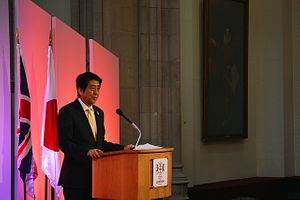Over the weekend, the Japan Times reported that Japanese Prime Minister Shinzo Abe could be the first Japanese prime minister to address a joint session of the U.S. Congress. According to the report, Japanese and American diplomats are finalizing preparations for a speech during a scheduled visit by the Japanese prime minister in late April. Despite their deep military alliance, Japanese prime ministers have rarely addressed U.S. lawmakers in Washington. The last Japanese prime minister to speak to a convened portion of Congress was Prime Minister Hayato Ikeda, who addressed the House of Representatives in 1961. Abe’s own grandfather, Nobsuke Kishi, addressed Congress in 1957 when he was prime minister.
Though Japan and the U.S.-Japan alliance has always garnered wide bipartisan support in Washington, Abe’s views on history have provoked some trepidation among U.S. legislators on both sides of the aisle. A group of U.S. legislators who traveled to Japan as recently as last week told reporters that the Japanese prime minister’s views on history could harm the prospects for a close and cooperative U.S.-Japan alliance. “Some of these… issues stemming out of the 70th anniversary of World War II, that could really put some cracks into the relationship,” Rep. Diana DeGette (D-CO 1st District) told the Wall Street Journal. “It’s really important that Japan not be seen as backtracking on… the comfort women issue and some of the other issues around the end of the war,” she added. Similarly, Rep. James Sensenbrenner (R-WI 5th District) noted that though the U.S. and Japan “had some bumps in the road,” it was time to “smooth those bumps out.” Abe’s “revisionist history” is harming “Japan’s standing with its neighbors,” he told the Journal, adding that this had to “be cooled down.”
Abe’s visit to the United States will come as the two allies revisit the terms of their defense cooperation guidelines. Additionally, the Abe government continues to press forward with attempts to unshackle Japan from its post-war constitutional restrictions on militarization. Since winning a second non-consecutive term as prime minister in late 2012 — Abe was prime minister of Japan for one year from 2006 to 2007 — Abe’s government has loosened Japan’s restrictions on defense exports, passed a resolution reinterpreting Japan’s constitutional ban on collective self-defense, created a National Security Council, and proposed a record defense budget, among other initiatives. Abe’s speech before U.S. lawmakers will be an important opportunity for the prime minister to present a frank and realistic vision of how he sees his country’s role evolving in Asia, and how Japan and the United States can maneuver their critical alliance to face new challenges, including that of a rising China.
With Abe’s 2012 victory, the Liberal Democratic Party (LDP) returned to power after three years of Democratic Party of Japan (DPJ) rule. Abe has been critical of the DPJ’s handling of the U.S.-Japan alliance. Abe’s speech before Congress should emphasize his government’s commitment to the alliance with the United States and assure U.S. lawmakers that Japan will not seek to revise its wartime history. The worrisome views that Abe and many other Japanese conservatives hold about Japan’s wartime history find no support on Capitol Hill. Abe should take the opportunity to reiterate Japan’s peaceful defense posture — what the prime minister has described as “proactive pacifism.”

































